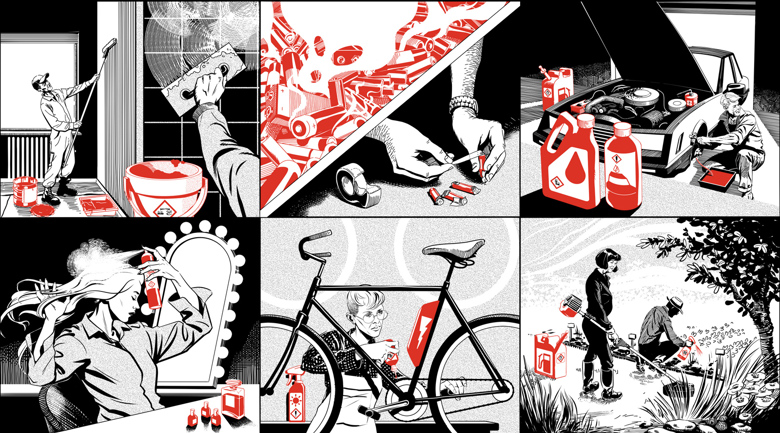Hazardous waste

Hazardous waste (formerly problem waste) includes materials and items that have been removed from use and that pose a particular threat to or harm people’s health or the environment. It is very important that hazardous waste not be sorted into mixed waste or poured down the drain but delivered instead to their respective separate waste collection.
Sort into hazardous waste
- energy-saving bulbs and other fluorescent lights
- batteries
- medications, needles and syringes (reception only in pharmacies)
- accumulators
- waste oils, oil filters and other oily waste
- solvents, such as turpentine, thinner, acetone, petrol, fuel oil and solvent-based washing detergents
- wet paint, glue and varnish
- wash water of painting tools
- pressurised packages, such as aerosol cans (that slosh or hiss)
- pressure impregnated wood (reception subject to a charge)
- wood preservatives and impregnants
- asbestos (reception subject to a charge)
- alkaline washing and cleaning detergents
- pesticides and disinfectants
- strong acids, such as sulphuric acid
- fertilizers and cement powder
- fire extinguishers and gas cylinders
- thermometers containing mercury
Explosives, rockets, ammunition and weapons: As indicated by the police. Emergency flares can usually be delivered to the stores selling them. Please contact the local police in advance.
Household medical waste, needles and syringes: Reception at pharmacies. For safety reasons, we do not accept this type of hazardous waste at the reception points for other hazardous waste. Reception of medical waste has been arranged in all pharmacies in the area.
Hazardous waste warning signs
Products containing hazardous chemicals are often labelled with warning signs depicting the possible dangers. A product marked with a warning sign is always hazardous waste.
These do not need to be sorted into hazardous waste
- empty or fully dried glue containers > mixed waste
- empty or fully dried paint cans > metal collection
- completely empty pressurised packages that no longer slosh or hiss > metal collection
- halogen and incandescent light bulbs > mixed waste
- LED bulbs > WEEE collection
- cigarette butts > mixed waste
- cooking fats > biowaste or mixed waste, large amounts collected separately
- fire alarms > WEEE collection
How to handle hazardous waste
-
1
Keep hazardous waste separate from other waste.
-
2
Do not mix different kinds of hazardous waste with each other.
-
3
Keep hazardous waste preferably in the original packaging or label the packages clearly.
-
4
Make sure that the packages are sealed and remain intact during transport.
These types of hazardous waste require your special attention
- Gas cylinders and large quantities of hazardous waste: deliver to Sortti Stations or the Kivikko Hazardous Waste Reception Station (open weekdays 7 am–4 pm).
- Barrels and large containers of hazardous waste: deliver to the Kivikko Hazardous Waste Reception Station (open weekdays 7 am–4 pm).
- Petrol: deliver to a collection point in an undamaged canister. If you wish to keep the canister, this is possible only at the Kivikko Hazardous Waste Reception Station (open weekdays 7 am–4 pm).
- Waste oils: pour into an oil drum or cube container at the collection point. Also sort the oil container into its respective collection container. There must be no other substances (e.g. petrol) in the oil, as this prevents the oil from being recycled.
- Paint: take cleaning liquids (detergent, solvent) of painting tools to hazardous waste collection as well. Do not pour the wash water down the drain. More information.
What happens to the collected hazardous waste?
We deliver hazardous waste from the collection points for further treatment, during which they are made safe both for people and the environment.
Raw materials that can be recycled are recovered during the treatment and reused. By recycling batteries and small accumulators, for example, you can ensure that the dangerous and hazardous substances found in them are treated appropriately and that their materials are utilised in the metal industry.
Where to take domestic hazardous waste?
We accept almost all hazardous waste from households free of charge at our Sortti Stations, hazardous waste collection points and touring collection vehicles. See exceptions below.
